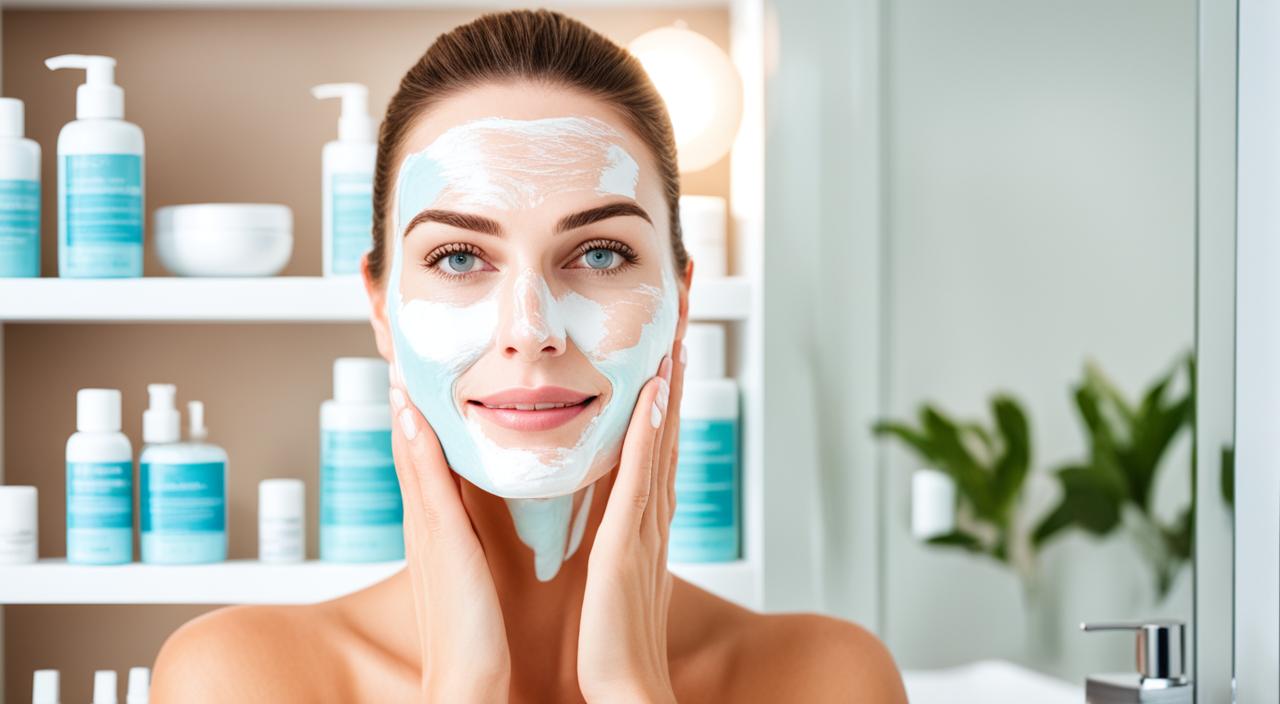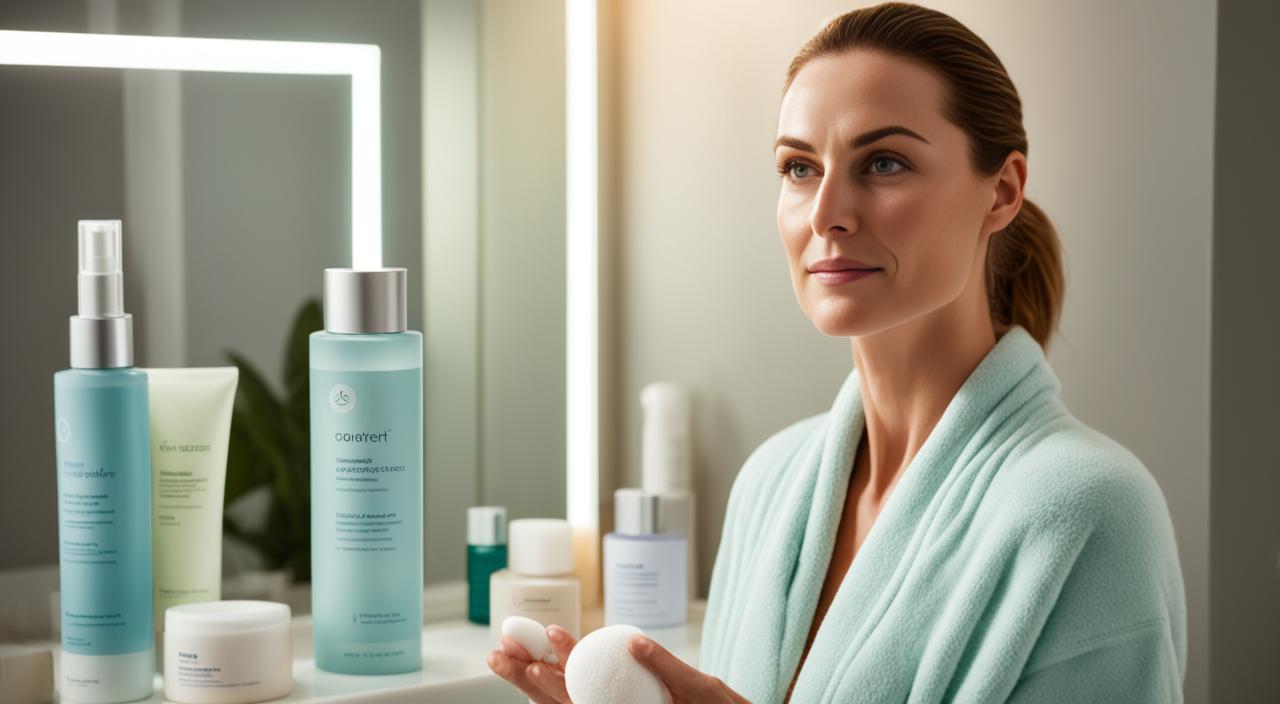Skin Care: 7 Tips For Healthy Skin

Tips For Healthy Skin : Your skin is a reflection of your overall health and well-being. Achieving and maintaining healthy skin is not just about applying skincare products. It requires a holistic approach that includes a proper skincare routine and adopting healthy habits. In this article, we will share 7 expert tips for achieving healthy, radiant skin.
Whether you’re dealing with skin concerns like acne, dryness, or aging, following these tips can help you improve your skin health and achieve the clear, glowing complexion you desire.
Key Takeaways:
- 1. Hydrate your skin by drinking enough water daily.
- 2. Engage in regular exercise to promote sweat and cleanse your pores.
- 3. Prioritize quality sleep to allow your skin to repair and rejuvenate.
- 4. Maintain a healthy diet rich in fruits, vegetables, and essential nutrients.
- 5. Use gentle, natural skincare products to minimize skin irritation and toxic load.
Drink More Water for Healthy Skin
Drinking an adequate amount of water daily is crucial for maintaining healthy skin. Not only is water a fundamental element for our overall well-being, but it also plays a significant role in the health and appearance of our skin. Proper hydration is essential to achieve a glowing complexion and support the internal organ health that contributes to our outer beauty.
Experts recommend a simple formula to determine your daily water intake: take half your body weight in ounces and drink that amount of water per day. For example, if you weigh 150 pounds, you should aim to drink at least 75 ounces of water daily. This formula ensures that you are adequately hydrating your body and replenishing the water lost through various bodily functions.
By increasing your water intake, you can enjoy numerous benefits for your skin. One of the most noticeable effects is the improvement in skin luster. When your body is well-hydrated, your skin appears radiant and healthy. Water helps to plump up the skin cells, reducing the appearance of wrinkles and fine lines.
Moreover, proper hydration supports the health of our internal organs, which in turn reflects on our skin. When our organs are functioning optimally, they can effectively eliminate toxins and waste from our body, allowing our skin to maintain its natural vitality. Drinking enough water also helps to regulate body temperature, ensuring that our skin stays balanced and healthy.
To maximize the benefits of water for your skin, it is important to establish a consistent water-drinking routine throughout the day. Carry a reusable water bottle with you to provide a reminder to stay hydrated. Additionally, you can enhance your water intake by incorporating hydrating foods such as fruits and vegetables into your diet. These foods not only provide hydration but also supply essential vitamins and minerals that contribute to overall skin health.
Remember, your skin is a reflection of your internal health. By prioritizing hydration and ensuring an adequate water intake, you can promote the luster of your skin and support the optimal functioning of your internal organs.
Sweat for Your Complexion

Regular exercise is not only beneficial for your physical health but also for your skin. When you exercise and sweat, it has a positive impact on your complexion due to various factors.
Pore Cleansing
When you sweat, your pores open up, allowing the dirt, bacteria, and other impurities trapped within them to be flushed out. This natural process helps cleanse your pores and prevent clogging, which can lead to acne breakouts and dull-looking skin.
Improved Circulation
Engaging in activities that raise your heart rate during exercise also improves blood circulation throughout your body, including your skin. Improved circulation ensures that essential nutrients and oxygen are delivered to your skin cells, promoting a healthy and glowing complexion.
Detoxification
Sweating is a natural way for your body to eliminate toxins. When you exercise and sweat, you’re helping your body detoxify by flushing out harmful substances through your skin. This detoxification process can contribute to a clearer and healthier-looking complexion.
Promotes Cellular Renewal
The process of sweating stimulates the production of collagen, a protein that plays a vital role in maintaining the elasticity and strength of your skin. Collagen helps in the regeneration of skin cells, promoting cellular renewal and a youthful appearance.
So, the next time you hit the gym or engage in any physical activity that makes you sweat, remember that you’re not only improving your fitness but also giving your complexion a well-deserved boost.
The Importance of Sleep for Skin Health

Getting enough sleep is crucial for maintaining healthy skin. Lack of sleep can affect the skin’s appearance, leading to various issues. When we don’t get adequate sleep, our bodies produce more cortisol, a stress hormone, which can result in increased inflammation in the skin. This inflammation can lead to skin conditions like acne, eczema, and psoriasis.
Poor sleep quality can also disrupt the skin’s natural healing and rejuvenation processes. During sleep, our bodies repair and regenerate skin cells, allowing for a healthy turnover of new cells. When sleep is compromised, this process is disrupted, resulting in dull and lackluster skin.
Additionally, lack of sleep can contribute to increased stress levels, which can negatively impact skin health. Stress triggers the release of hormones that can worsen existing skin conditions and lead to breakouts. It can also impair the skin’s barrier function, making it more susceptible to damage from environmental aggressors.
To promote better sleep quality and support healthy skin, it’s essential to establish evening bedtime rituals that promote relaxation and stress management. Here are a few tips:
- Create a calming bedtime routine that includes activities like reading a book, taking a warm bath, or practicing meditation.
- Avoid electronic devices, especially smartphones and laptops, before bed, as the blue light emitted by these devices can disrupt sleep patterns.
- Ensure your sleep environment is dark, quiet, and at a comfortable temperature.
- Avoid caffeine and heavy meals close to bedtime, as they can interfere with sleep.
- Try incorporating relaxation techniques like deep breathing exercises or gentle stretching before bed to help ease tension and promote relaxation.
By prioritizing sleep and implementing effective stress management techniques, you can improve sleep quality, promote a healthy mind, and enhance your skin’s complexion.
Healthy Diet, Healthy Skin
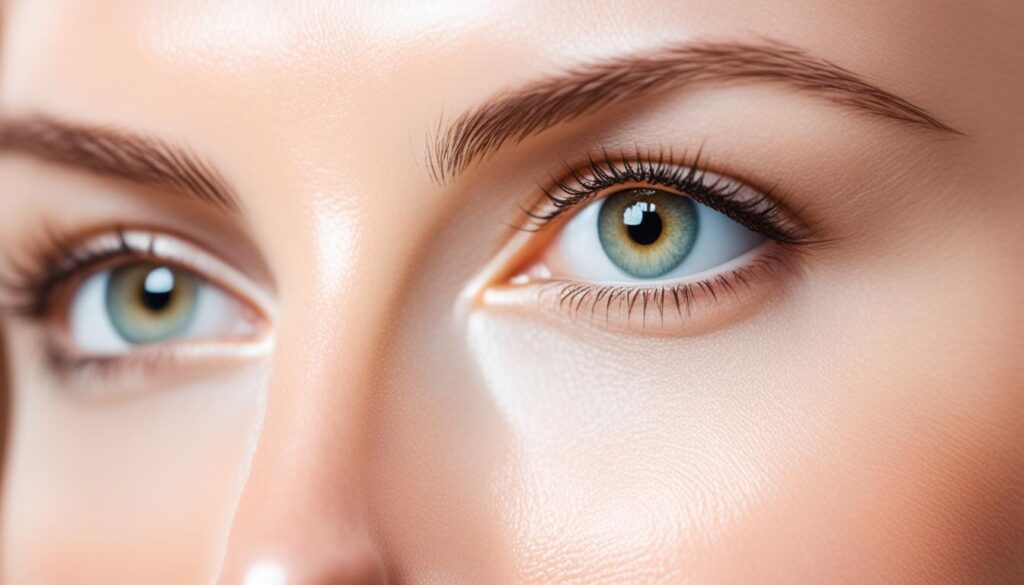
A healthy diet plays a significant role in achieving healthy skin. Consuming a diet rich in fruits and vegetables and avoiding saturated fats and excess sugars can contribute to skin improvement. Incorporating a variety of nutrition-packed fruits and vegetables into your meals provides essential vitamins, minerals, and antioxidants that are beneficial for your skin.
Fruits and vegetables are known for their high content of essential nutrients that support skin health. For example, citrus fruits like oranges and strawberries are rich in vitamin C, which helps boost collagen production, a crucial protein for skin structure and elasticity. Leafy greens such as spinach and kale are excellent sources of vitamins A and E, which protect against oxidative damage and promote skin rejuvenation.
Did you know? A study published in the American Journal of Clinical Nutrition found that a higher intake of fruits and vegetables was associated with a lower prevalence of skin aging signs, such as wrinkles and dryness.
In addition to a diet rich in fruits and vegetables, considering a whole-food vitamin supplement can ensure your body receives the necessary nutrients to support vibrant skin. Whole-food supplements are derived from real foods and contain a wide range of nutrients in their natural form, making them more easily absorbed and utilized by the body.
Remember, nourishing your skin from the inside out is as important as external skincare routines. By prioritizing nutrition and incorporating whole-food vitamin supplements, you can enhance your skin’s natural radiance and promote overall skin health.
Treat Your Skin Gently
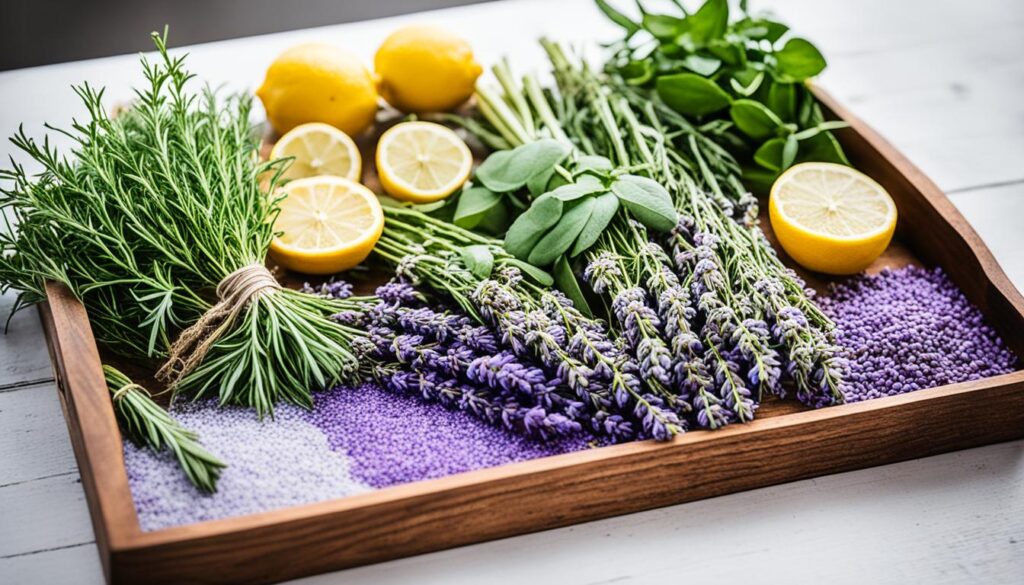
When it comes to maintaining healthy skin, treating it gently is crucial. One way to achieve this is by using all-natural, non-toxic skincare products. Unlike conventional products that often contain artificial scents and chemicals, natural skincare products are gentle on the skin and help minimize the toxic load in your body.
Many conventional skincare products can cause skin irritation and allergic reactions due to the harsh ingredients they contain. By opting for natural alternatives, you can reduce the risk of these adverse effects and promote healthier skin.
Checking the ingredients list of your skincare products is essential. Look for products that prioritize natural and organic ingredients, free from harmful chemicals like parabens, sulfates, and phthalates. By doing so, you can minimize the potential for skin irritation and create a skincare routine that is kind to your skin and overall well-being.
Using natural skincare products is one of the best ways to take care of your skin. These products contain ingredients that are derived from nature and are free from harmful chemicals. By choosing natural alternatives, you can protect your skin from unnecessary irritation and maintain a healthier complexion.
Exfoliate for a Brighter Complexion
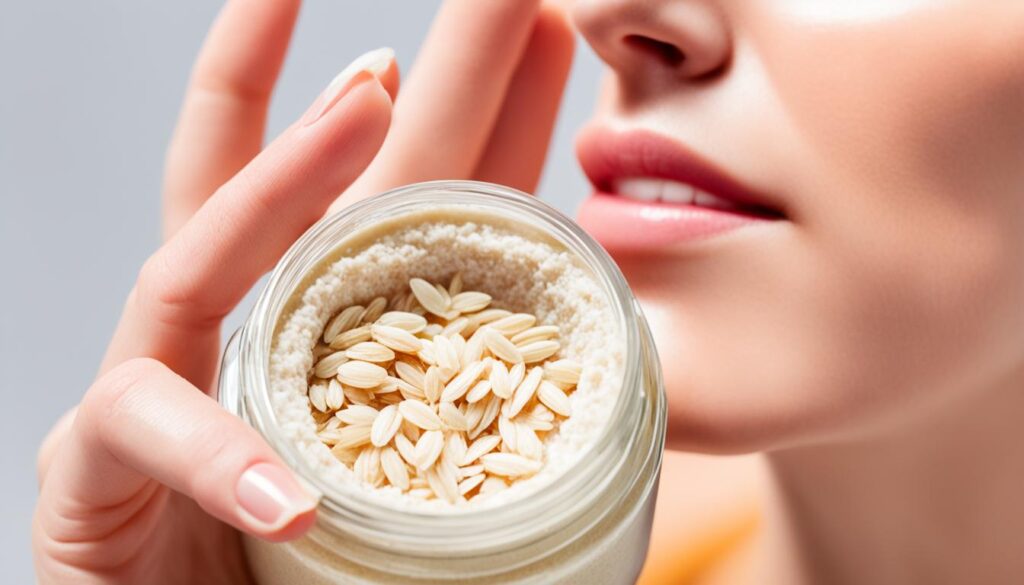
Regular exfoliation is crucial for achieving a brighter complexion. By exfoliating, you remove dry and dead skin cells, revealing healthier and younger-looking skin. But exfoliation offers more than just surface-level benefits. It also promotes skin detoxification, reduces fine lines and sun damage, improves skin tone, and even helps prevent breakouts and ingrown hairs.
If you want to reap these benefits, it’s recommended to exfoliate your face and body twice a week. By incorporating exfoliation into your skincare routine, you can enhance the overall health and appearance of your skin.
Benefits of Exfoliation
Exfoliation offers a range of benefits that contribute to a brighter and more youthful complexion:
- Dead Skin Removal: Exfoliation removes dead skin cells that can make your skin appear dull and lackluster. By eliminating these cells, you create a smoother surface for your skin to reflect light, resulting in a radiant glow.
- Skin Tone Improvement: Regular exfoliation can help even out your skin tone by reducing the appearance of dark spots and hyperpigmentation. It encourages cell turnover, revealing fresher and more even-toned skin.
- Anti-Aging Benefits: Exfoliation stimulates collagen production, which diminishes the appearance of fine lines and wrinkles. It also helps minimize the signs of sun damage, such as sunspots and uneven texture.
It’s important to note that while exfoliation offers many benefits, it’s crucial to use gentle exfoliants and avoid over-exfoliating. Excessive exfoliation can lead to skin irritation and disrupt your skin’s natural barrier function.
“Exfoliating regularly can help remove the buildup of dead skin cells, unclog pores, and allow your skincare products to penetrate more effectively. However, it is essential to choose an exfoliator that suits your skin type and avoid harsh scrubbing motions.”
By incorporating exfoliation into your skincare routine, you can achieve a brighter complexion and enjoy the many benefits it offers. Remember to choose exfoliating products that are suitable for your skin type and follow the recommended frequency to avoid any potential skin irritations caused by over-exfoliation.
| Exfoliation Frequency | Exfoliation Methods |
|---|---|
| Face | Gentle facial scrubs, chemical exfoliants (such as AHAs or BHAs), or cleansing brushes |
| Body | Exfoliating body scrubs, loofahs, dry brushing |
Moisturize for Happy Skin
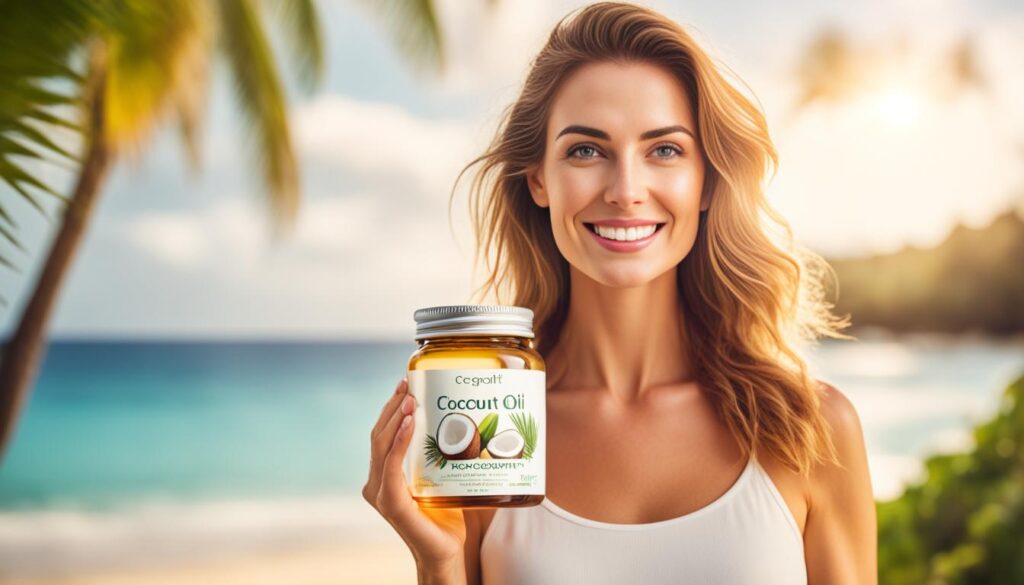
Moisturizing is essential for maintaining happy and hydrated skin. When it comes to natural moisturizers, coconut oil is a top contender. Its nourishing properties and ability to lock in moisture make it a popular choice for skincare enthusiasts.
Coconut oil is rich in vitamins K and E, which play a vital role in maintaining skin health. Vitamin K helps reduce dark circles and under-eye puffiness, while vitamin E acts as an antioxidant, protecting the skin from damage caused by free radicals.
Additionally, coconut oil contains anti-inflammatory substances that can soothe irritated skin and reduce redness. Its lightweight consistency allows for easy absorption, leaving the skin feeling soft and supple.
One of the key benefits of using coconut oil as a moisturizer is its ability to prevent dehydration. Its unique composition helps retain moisture in the skin, preventing dryness and maintaining optimal hydration levels.
Coconut oil can be used on its own as a moisturizer or incorporated into skincare products such as lotions and creams. It’s important to note that a little goes a long way with coconut oil, so use it sparingly to avoid a greasy feel.
Benefits of Coconut Oil as a Natural Moisturizer:
- Deep hydration: Coconut oil penetrates the skin deeply, providing long-lasting hydration.
- Nourishes the skin: Its rich composition nourishes the skin, leaving it soft and supple.
- Antioxidant protection: The vitamins in coconut oil act as antioxidants, protecting the skin from damage caused by free radicals.
- Anti-inflammatory properties: Coconut oil soothes irritated skin and reduces inflammation.
Next, let’s take a look at proper exfoliation techniques to further enhance your skin’s radiance and health.
Conclusion
Taking care of your skin is a continuous process that requires implementing these 7 tips for healthy skin. Following a well-rounded skincare routine, including hydration, exercise, sleep, and a healthy diet, along with gentle treatment and regular exfoliation, can contribute to a radiant complexion and overall skin health.
Remember to moisturize and protect your skin from the sun to maintain its health and beauty. By incorporating these skin care tips into your daily routine, you can effectively maintain healthy skin and enjoy a glowing and radiant complexion.
It’s important to prioritize your skin’s health and regularly monitor your skincare routine to ensure it is tailored to your specific needs. With consistent care and attention, you can achieve and maintain the healthy and radiant skin you desire. So start implementing these tips today and enjoy the benefits of a happy, hydrated, and glowing complexion!
Also Refer : Say Goodbye To Skincare Woes: Expert Solutions For Radiant Skin
FAQs
Q: What is the importance of skin care?
A: Skin care is crucial as it helps in maintaining the health and appearance of your skin, protecting it from various skin problems and ensuring it stays healthy and glowing.
Q: How can I determine my skin type?
A: Understanding your skin type is important to choose the right skin care products. You can determine your skin type by observing how your skin feels throughout the day – whether it’s oily, dry skin, combination, or normal.
Q: Why is it important to use sunscreen with SPF?
A: Sunscreen with SPF protects your skin from harmful UV rays, reduces the risk of skin cancer, and prevents premature aging and sun damage.
Q: What are some tips for healthy skin?
A: Some tips for healthy skin include keeping your skin hydrated, eating healthy fats, managing stress, getting enough hours of sleep, and using SPF sunscreen to protect your skin broad-spectrum sun protection.
Q: How does a skincare routine help in maintaining skin health?
A: A skincare routine helps in cleansing, exfoliating, moisturizing, and protecting your skin. It ensures that your skin stays healthy, radiant, and free from issues like acne and premature aging.
Q: Why is it important to remove dead skin cells?
A: Removing dead skin cells is essential for skin regeneration, as it helps in improving skin texture, unclogging pores, and allowing better absorption of skin care products.
Q: How can natural skin be maintained?
A: Natural skin can be maintained by using gentle cleansers, avoiding harsh chemicals, eating a balanced diet, staying hydrated, and protecting your skin from harmful UV rays with sunscreen.




